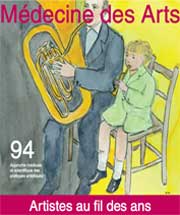Arts Medicine Journal N°94 artists' health over time

Arts Medicine Journal N°94 artists' health over timeArtists' health, musician's health
Issue 94 Artists' health over time
Medical and scientific approach to artistic practices
Free Shipping
The articles of the journal are not sold independently, the price of 17 euros corresponds to the price of the whole magazine, all articles and chronicles.
Ageing is not a pathology. Over time, our bodies undergo changes that affect our organic, physiological and cognitive functions to varying degrees. The subject of this new issue of Médecine des Arts is the impact of advancing age on the health of artists, musicians, singers and dancers, and the consequences of age on artistic practice, depending on the discipline.
The art of nuance Edito N°94
Abstract"How can you feel and guess what is not written? - It's inexplicable," replies conductor Nathalie Stuzmann, "except through poetry, because that's where the mystery of interpretation lies. Analysis and reason are necessary to avoid being shaken by every jolt of our emotions, but they are not enough to grasp certain unspeakable spaces. "First I serve the work through analysis. Then I put my whole life into it," adds Natathie Stuzmann....
Read more in issue 94 ....
motivational interviewing : a communication method used for patients and in... musical pedagogy
AbstractMotivational interviewing is a collaborative communication tool primarily used in the field of care. It is intended to increase a person's motivation and commitment to a specific goal by bringing out their own reasons for changing. On the "caregiver”’s side, motivational interviewing requires empathic listening focusing on the person and not on the goal as well as acceptance of the patient's choice. After introducing the principles and tools of motivational interviewing, the author explains how to transpose it into the field of musical education. Collaboration, non-judgment, altruism, evocation, which are the pillars of the mindset of motivational interviewing, can become those of teaching music in private lessons, as well as the processes and the key communication skills that are used in this sort of communication. The benefit for the student will cover motivation, concentration, autonomy and self-confidence. Thus, motivational interviewing could be used with profit by both music teachers and health professionals.
How does ageing impact musicians and singers?
AbstractThe purpose of the study is to ascertain how musicians see age-related physiological changes and how they deal with such changes in their musical practice.
Two questionnaires were used. The first questionnaire collected 932 responses from musicians and singers from 27 countries. These numerous data reported by musicians show both positive age-related impacts and negative impacts on their organic, physiological and cognitive functions, as well as adjustment strategies helping them continue their musical practice. The analysis of these results is carried out according to age groups and according to the main instrument played.
The second questionnaire, sent to musicians who answered the first questionnaire and who consent to being contacted again, helped collect more advanced data on the different organ systems affected according to the instrumental family. Based on the responses of 184 musicians, the authors stress the physiological and cognitive changes reported by musicians, in what proportion, and which groups of instrumentalists over 50 are most frequently affected by such changes. This study also shows that age-related changes do not seem incompatible with instrumental or vocal practice until old age.
Artists over the years. Singing, instrumental music, dance and theatre over the years.
AbstractMany aspects of ageing and artistic practices are presented. Depending on the context, the discipline and the parts of the body involved,
- Orchestral musicians and the impact of age on practice
- The effect of age on the voice of opera singers
- Singing through the years
- Singers aged 60 and over
- Injuries and age and gender differences in dance sport
- Mortice memory in elderly classical dancers
- The benefits of dance at any age
- Music or theatre? Comparison of mnemonic and executive performance
- The musician's brain from learning to old age
- Musical practice and the auditory neural system over the years
- Aging in good health by playing an instrument throughout life
- Cognitive functioning in older musicians: the benefits of not stopping playing
- Cognitive effect of occasional moderate or intensive music playing?
- Mortality of pop and rock stars and negative childhood experiences
- Using artificial intelligence to predict the onset of anxiety disorders in adolescence
Portrait of the artist as worker N°94
AbstractDifferent aspects of the professional life of artists are presented in this section, depending on the discipline and the context of the artistic practice.
Version papier
17€
Subscription, France, EEC (1 year, 2 issues)
34€
Subscription Outside EEC (1 year, 2 issues)
37€
Les garanties médecine des arts
Articles en stock
Envoi dans les 24h
Paiement
en ligne sécurisé
Une question ?
